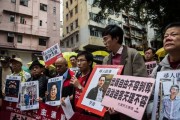Press Freedom in China
From Freedom House (2015) “China is home to one of the world’s most restrictive media environments. The already limited space for investigative journalism and politically liberal commentary shrank during 2014, continuing a trend of ideological tightening since Xi Jinping assumed the leadership of Chinese Communist Party (CCP) in 2012. For the first time in several years, professional journalists from established news outlets were subjected to long-term detention, sentencing, and imprisonment alongside freelancers, online activists, and ethnic minority reporters. Also during 2014, a crackdown on social-media platforms that began the previous year—with increased restrictions on the prominent Sina Weibo microblogging service—expanded to Tencent’s WeChat instant-messaging program, further reducing the ability of ordinary users and journalists to share information and political news without prepublication censorship.
Nevertheless, as internet access via mobile devices continued to climb, reaching over half a billion people during the year, the censorship system was unable to completely stop the circulation of unfavorable news. Dedicated users continued to employ circumvention technology and other, more creative tactics to defy and bypass restrictions on free expression.”

